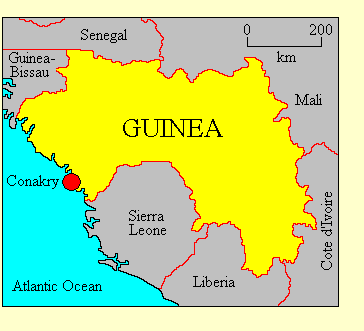
REPUBLIC OF GUINEA
• Official name: Republique de Guinee (Republic of Guinea)
• Location: West Africa
• International organisations: African, Caribbean and Pacific Group of States, African Union,
Non-Aligned Movement, Organisation Internationale de la Francophonie, Organisation of Islamic
Conference, United Nations, World Trade Organisation
• Borders: Cote d'Ivoire, Guinea-Bissau, Liberia, Mali, Senegal, Sierra Leone
• Coastline: North Atlantic Ocean
• Land area: 245,857 Km2
• Population: 10,100,000
• Annual GDP (PPP) per capita: US$1,000 (2009 CIA estimate). World ranking: 178
• Ethnicity: Almost of the entire population is of West African stock. The largest
groups are the Peuhl (40%), Malinke (30%) and Soussou (20%).
• Languages: French is the official language and the language of government and business.
A large number of African languages are spoken.
• Religion: Sunni Moslem 85%, Catholic Christian 8%, indigenous beliefs 7%.
• Form of government: Presidential democracy. Guinea is divided into
33 prefectures and the Conakry special zone.
• Capital: Conakry
• Constitution: The
Constitution of the Republic of Guinea came into effect on 23 December 1990.
• Head of state: The President, elected by direct universal suffrage
for a five-year term.
• Head of government: The Prime Minister, appointed by the President.
• Legislature: Guinea has a unicameral legislature. The National Assembly (Assemblee Nationale)
has 114 members elected for four-year terms, 38 members elected from single-member constituencies and
76 by proportional representation. The Assembly is currently suspended.
• Electoral authority: The government conducts national elections.
• Freedom House 2011 rating: Political Rights 5, Civil Liberties 5
• Transparency International Corruption Index: 20% (164 of 178 countries rated)
• Reporters Without Borders Press Freedom 2010 Index: 66.5% (113 of 178 countries rated)
• Heritage Foundation Economic Freedom 2010 Index: 51.7% (137 of 178 countries rated)
Political history
The area which in now Guinea was governed by a number of Islamic rulers until it
was brought under French control in the early 19th century. Guinea formally became a
French colony in 1845. After World War II, Guinea became part of the
Federation of French West Africa. In 1958, however, Guinea became the only French
colony to reject membership of the French Community. Independence followed immediately,
and the nationalist leader Ahmed Sekou Toure, became president.

Toure established a one-party socialist regime, which produced the usual
results: by the time of Toure's death in 1984 Guinea was bankrupt and totally
isolated, with a million Guineans living in exile. A military government, headed by
General Lansana Conte, succeeded Toure. After nine years of military rule, a multi-party system was
established and Conte was elected president in 1993, 1998 and 2003. Despite the
formal appearance of multi-party politics, however, Conte increasingly manipulated the
constitution and the electoral process to perpetuate his own power.
Conte died in December 2008, and a group of officers immediately seized power, suspending the
Constitution and civil liberties. Captain Moussa Camara headed the military regime. In December 2009,
however, he was severely wounded in an assassination attempt by a rival military group. Another
officer, Sekouba Konate, took control. In January 2010 Jean-Marie Dore, a civilian
politician, was appointed Prime Minister, and said that he was committed to free elections. The elections finally took
place in June and November 2010, and the veteran oppositionist
Alpha Conde was elected, becoming Guinea's first-ever
democratically elected leader.
Freedom House's 2011
report on Guinea
says: "Guinea is not an electoral democracy. While the 2010 presidential election process was deemed free and fair by
observers, legislative elections had not been held by year's end... The 2010 elections represented the country's first ever
peaceful rotation of power. In May 2010, President Sekouba Konate approved a new constitution which reinforces democratic
rights, including explicitly outlining the legal status of the prime minister and establishing a number of bodies such as an
independent electoral commission, a national human rights body, and a constitutional court. There are several significant
political parties, most of which have clear regional and ethnic bases. Corruption has been cited as a serious problem by
international donors, and many government activities are shrouded in secrecy... In June 2010, the TNC passed two new media
laws to replace restrictive legislation from 1991. One of the laws decriminalised press offenses and more clearly defined
defamation provisions, while the other provided for the creation of a new media regulatory body, the Higher Authority of
Communication (HAC). The new laws, which were written in consultation with journalists and media executives, are applied
to online and state-owned media in addition to print outlets... Freedoms of association and assembly, which had been
seriously circumscribed, were generally respected in 2010... Many established and emerging nongovernmental organisations
and civil society groups expanded their activities in 2010... Under former president Conte, the nominally independent courts
were marred by corruption, a lack of resources, nepotism, ethnic bias, and political interference. The judicial system
demonstrated a modest degree of independence in 2010."
Updated November 2011
|

